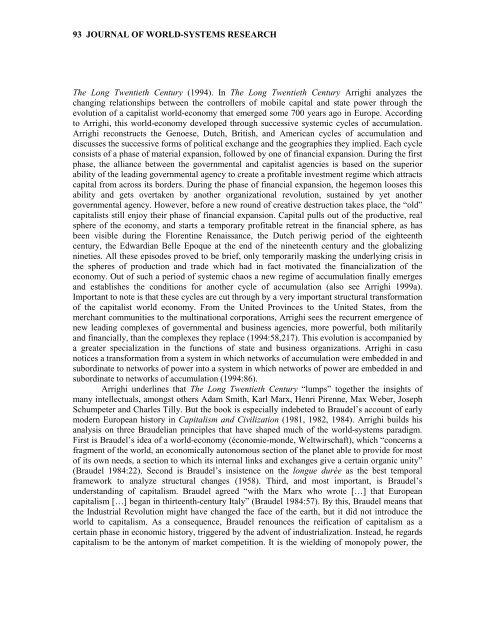Entire Volume 17 issue 1 - Journal of World-Systems Research ...
Entire Volume 17 issue 1 - Journal of World-Systems Research ...
Entire Volume 17 issue 1 - Journal of World-Systems Research ...
You also want an ePaper? Increase the reach of your titles
YUMPU automatically turns print PDFs into web optimized ePapers that Google loves.
93 JOURNAL OF WORLD-SYSTEMS RESEARCH<br />
The Long Twentieth Century (1994). In The Long Twentieth Century Arrighi analyzes the<br />
changing relationships between the controllers <strong>of</strong> mobile capital and state power through the<br />
evolution <strong>of</strong> a capitalist world-economy that emerged some 700 years ago in Europe. According<br />
to Arrighi, this world-economy developed through successive systemic cycles <strong>of</strong> accumulation.<br />
Arrighi reconstructs the Genoese, Dutch, British, and American cycles <strong>of</strong> accumulation and<br />
discusses the successive forms <strong>of</strong> political exchange and the geographies they implied. Each cycle<br />
consists <strong>of</strong> a phase <strong>of</strong> material expansion, followed by one <strong>of</strong> financial expansion. During the first<br />
phase, the alliance between the governmental and capitalist agencies is based on the superior<br />
ability <strong>of</strong> the leading governmental agency to create a pr<strong>of</strong>itable investment regime which attracts<br />
capital from across its borders. During the phase <strong>of</strong> financial expansion, the hegemon looses this<br />
ability and gets overtaken by another organizational revolution, sustained by yet another<br />
governmental agency. However, before a new round <strong>of</strong> creative destruction takes place, the “old”<br />
capitalists still enjoy their phase <strong>of</strong> financial expansion. Capital pulls out <strong>of</strong> the productive, real<br />
sphere <strong>of</strong> the economy, and starts a temporary pr<strong>of</strong>itable retreat in the financial sphere, as has<br />
been visible during the Florentine Renaissance, the Dutch periwig period <strong>of</strong> the eighteenth<br />
century, the Edwardian Belle Epoque at the end <strong>of</strong> the nineteenth century and the globalizing<br />
nineties. All these episodes proved to be brief, only temporarily masking the underlying crisis in<br />
the spheres <strong>of</strong> production and trade which had in fact motivated the financialization <strong>of</strong> the<br />
economy. Out <strong>of</strong> such a period <strong>of</strong> systemic chaos a new regime <strong>of</strong> accumulation finally emerges<br />
and establishes the conditions for another cycle <strong>of</strong> accumulation (also see Arrighi 1999a).<br />
Important to note is that these cycles are cut through by a very important structural transformation<br />
<strong>of</strong> the capitalist world economy. From the United Provinces to the United States, from the<br />
merchant communities to the multinational corporations, Arrighi sees the recurrent emergence <strong>of</strong><br />
new leading complexes <strong>of</strong> governmental and business agencies, more powerful, both militarily<br />
and financially, than the complexes they replace (1994:58,2<strong>17</strong>). This evolution is accompanied by<br />
a greater specialization in the functions <strong>of</strong> state and business organizations. Arrighi in casu<br />
notices a transformation from a system in which networks <strong>of</strong> accumulation were embedded in and<br />
subordinate to networks <strong>of</strong> power into a system in which networks <strong>of</strong> power are embedded in and<br />
subordinate to networks <strong>of</strong> accumulation (1994:86).<br />
Arrighi underlines that The Long Twentieth Century “lumps” together the insights <strong>of</strong><br />
many intellectuals, amongst others Adam Smith, Karl Marx, Henri Pirenne, Max Weber, Joseph<br />
Schumpeter and Charles Tilly. But the book is especially indebeted to Braudel’s account <strong>of</strong> early<br />
modern European history in Capitalism and Civilization (1981, 1982, 1984). Arrighi builds his<br />
analysis on three Braudelian principles that have shaped much <strong>of</strong> the world-systems paradigm.<br />
First is Braudel’s idea <strong>of</strong> a world-economy (économie-monde, Weltwirschaft), which “concerns a<br />
fragment <strong>of</strong> the world, an economically autonomous section <strong>of</strong> the planet able to provide for most<br />
<strong>of</strong> its own needs, a section to which its internal links and exchanges give a certain organic unity”<br />
(Braudel 1984:22). Second is Braudel’s insistence on the longue durée as the best temporal<br />
framework to analyze structural changes (1958). Third, and most important, is Braudel’s<br />
understanding <strong>of</strong> capitalism. Braudel agreed “with the Marx who wrote […] that European<br />
capitalism […] began in thirteenth-century Italy” (Braudel 1984:57). By this, Braudel means that<br />
the Industrial Revolution might have changed the face <strong>of</strong> the earth, but it did not introduce the<br />
world to capitalism. As a consequence, Braudel renounces the reification <strong>of</strong> capitalism as a<br />
certain phase in economic history, triggered by the advent <strong>of</strong> industrialization. Instead, he regards<br />
capitalism to be the antonym <strong>of</strong> market competition. It is the wielding <strong>of</strong> monopoly power, the





